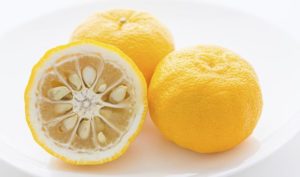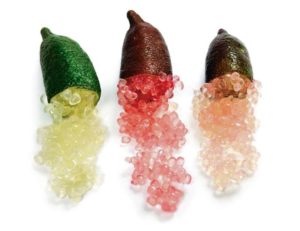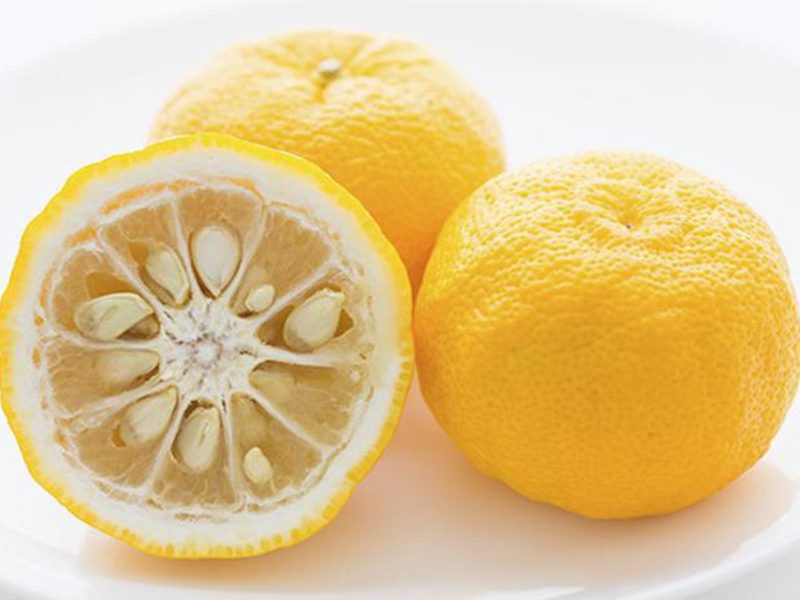
Yuzu
So what is the new Yuzu? It’s citrus that’s virtually unknown in the Lowcountry. I discovered it by watching some of the British and chef’s cooking shows on TV.
Yuzu is a citrus from Japan, similar to a lemon, but with a deeper and sharper flavor. It looks a little like a lemon, but flatter with knobbier rinds. The tree has the usual evergreen, shiny foliage. It should be hardy in most of the Lowcountry. I planted mine in February of 2020. It yielded 3 ripe fruit by mid-October. I expect a heavier crop the following years, since it was really just a sapling when I planted it. All commercial citrus are grafted onto hardy root stock, and the scion (the part that is grafted) remembers how old the tree from which it was taken was, and will begin fruiting usually within a year or two. Citrus from seeds takes up to 7 or 8 years to produce fruit. Since most commercial citrus are hybrids, you won’t know what you’re getting for years.
If you can ever find fresh Yuzu for sale, they’re quite expensive – over a dollar or two per fruit.
All parts of the Yuzu are useful. You can make a refreshing skin toner by soaking the seeds in water until it gets cloudy and viscous. The water will keep in the refrigerator for a couple of months.
Yuzu are not as juicy as lemons, and the ratio of seeds to flesh is high. I managed to force less than a teaspoon of juice from a nice sized yuzu. Maybe that’s why bottled products are so expensive, too. The juice can be added to almost any sauce for a deep, resonant lemony taste, and the rind can be zested for cakes, pies, sorbets, puddings and curds, or cut into pieces for soups, stews, ragouts, and marinades. You can even make marmalade from the shredded rind and juice. A spoonful of marmalade in a cup of hot water makes a wonderfully aromatic herbal tea.
In short, you can use it much as you would a lemon, only use a lot less or you will be overpowered by the lemony taste and sharpness. It’s not a lemon replacement. True, it’s taste is lemony, but it’s a different flavor altogether. The popular Ponzu seasoning sauce uses Yuzu as its base.
To store lemons and limes you are going to cook with, simply wash and dry the whole fruits, and place them in plastic bags and freeze them solid. It then is very easy to run a zester over the frozen rind, and the juice tastes like fresh.
Another unusual fruit just being introduced to the American market is the

Finger Limes
Australian Finger Lime. I bought my tree at the same time as my Yuzu, but even though it had three flushes of flowers, I didn’t get a single fruit from the tree the year I planted it I’m hopeful for future years because I had been looking for this tree for several years. Not only is this lime unique in shape, but the vesticles (the little sacs that carry the juice and pulp) are not encased in segments like they are in other citrus fruits. Thus they can be sprinkled over food. They give the taster a delightful tiny burst of flavor that is far different from a sprinkle of juice.
Finger limes actually come in different colors, the green ones can have clear or light green vesticles, and the red ones actually have red or pink vesticles.
Like other limes, they are not really hardy in the Lowcountry, and should be taken in or protected from freezing weather. The tree itself has very small leaves, with long sharp needles all along its branches and twigs. Harvest the fruit with care!
One of my favorite citrus is the ‘Kishu’ orange, a delightful easy-peel fruit smaller even than a Clementine. It’s virtually seedless and sweet as honey. Because they are so small, you can easily cut a fruiting branch, hang it upside down in your garage, and it will dry into a lovely branch to use for holiday decorations. And it will last for years. Once your tree is established, the yearly harvest is bountiful. I put several in Christmas stockings. I scrape the pith from the peels and leave them to dry on a windowsill. A small piece in your cup of tea adds a whole new dimension and is great added to veggies, such as carrots, and stews. I love the name and I just found out you can preserve them whole!
For those of you who don’t have the room for a citrus, most will grow and fruit well in large pots. The deer aren’t fond of mature foliage, but the fruit and young growth foliage is like deer candy. They’re evergreen, have few pests, incredibly fragrant flowers and fruit that will stay fresh on the tree for months! I can hardly think of a tree that offers more.
I have managed to plant 10 different citrus trees on my acre+ lot, and when they’re all in blossom, you can get drunk from the fragrance. If you run short of lemons, limes, oranges or kumquats, like Rosemary Clooney says, “come ona’ my house.”







